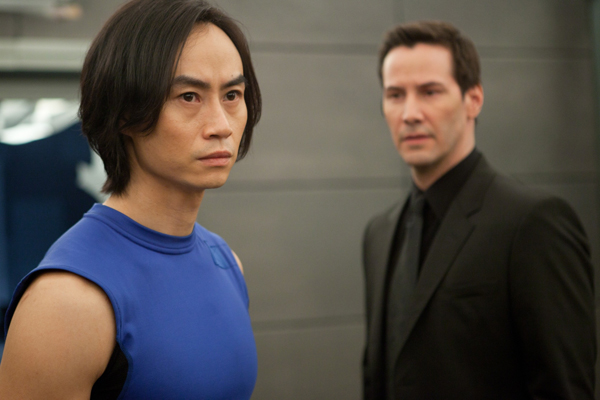 |
| Tiger Chen as Tiger Chen and Keanu Reeves as Donaka Mark |
One day, Mark sees Chen on TV, participating in a local martial-arts contest; Chen is victorious, and during his post-fight interview, he says he wants to show the world that tai chi is an effective fighting system. Because Chen has something to prove, Mark knows how best to corrupt the younger man. Mark eventually persuades Chen to fight for him; Chen refuses to fight for money, but accepts handsome payments, anyway, to help his parents and keep his master's temple from being razed. With each successive fight, though, Chen gives in to his native viciousness until he finally realizes he is in danger of losing his soul and hurting the ones closest to him. Mark, meanwhile, revels in Chen's moral corrosion.
The film gives us a rare opportunity to judge Reeves as both an actor and a director. Reeves is no classically trained Shakespearean, and I can't say that his acting in this film is going to win him any awards. All the same, he conveys his character's malevolence convincingly, and stalks about his shadowy domain with the deadly grace of a predator. As a director, Reeves shows both more talent and more potential: he has a very good sense of atmospherics, and he understands the technical aspects of filmmaking, such as timing, pace, lighting, and editing. His fight scenes are clear; they allow the stunt work of fight choreographer Yuen Wo-ping to shine. (Yuen choreographed "Crouching Tiger, Hidden Dragon" as well as all three Matrix movies.) Reeves doesn't seem interested in gimmicky, swooping camera moves or other forms of cinematic trickery; his style is unpretentious and unintrusive.
The story's setup stands in contrast with the general silliness of the wuxia genre. Although the movie's plot and dialogue dip us, the viewers, in a rather shallow pool of East Asian philosophy, the underlying theme strikes me as Judeo-Christian: this is a film about a person making a deal with the devil and attempting to find his way back to redemption. I was reminded of other movies: "Platoon" immediately came to mind as a similar story about a young man caught between two father figures—one who is wise and gentle, and another who is dark and cynical. "The Devil's Advocate," in which Reeves also starred, came to mind as well, for it seemed to me that, in "Man of Tai Chi," Reeves had assumed the tempter's role originally played by Al Pacino in that other film.
The movie's plot is kept straightforward and coherent; there's the "A story," in which we track Chen's temptation and fall; there's also the "B story," which follows the police's efforts to bust Donaka Mark for his illegal fighting ring. What I liked best about the plot was its focus on character. Most wuxia films of lesser quality tend to fixate on the fighting, eschewing depth for spectacle. Also praiseworthy was the fight choreography, which used a minimum of wire-fu (Yuen Wo-ping may be evolving along with his audience, as wire-fu has lately fallen out of favor), and which also—surprisingly—showed the fights as unpolished. Fist and foot impacts were accompanied by only modest sound effects; the camera tended to hang back, allowing us to see that a flurry of blows might land, but might not always land with great force. This was a risky move on both the director's and the choreographer's part, but I thought it added a bit of grit and realism to the fight scenes—another trait not often seen in wuxia cinema.
The only truly disappointing aspect of the film was that it relied on "Karate Kid"-style trickery at the very end. You may recall how, in both "The Karate Kid" and "The Karate Kid Part II," Daniel-san (Ralph Macchio) learned a "signature" move that allowed him to defeat his opponent. This was easily the weakest element in both Karate Kid films—more gimmick than substance. In "Man of Tai Chi," there's an aggressive chi move performed by both Master Yang and Tiger Chen that I found completely unbelievable. I still enjoyed the overall story, but I felt that this bit of fakery had no place in a morality tale that had, otherwise, attempted to keep things grounded in reality.
As directorial debuts go, "Man of Tai Chi" is quite respectable. I think Keanu Reeves has an enriching career ahead of him. I'm tempted to say that he should go the way of Sofia Coppola, who quickly discovered that she was awful in front of a camera but a maestra behind one. But I'm not willing to concede that Keanu is really all that awful as an actor: his line deliveries and facial expressions tend to be wooden, yes, but he's photogenic, not to mention an amazing physical actor, as his performance in the Matrix movies proves. Also, he's no longer young: in 2014, Reeves stands on the brink of fifty, and time has at last begun to bestow some world-weary gravitas upon him.
I've tried to avoid talking about how the movie ends. You may think you know how the story goes if you've seen the preview trailer, and you may think that this review has dropped hints about Tiger Chen's eventual redemption after swimming for a time in darkness. But the ending isn't quite as clear-cut as all that. You'll just have to see the movie for yourself to understand what I mean. After that, it's up to you to decide whether "Man of Tai Chi" truly ends happily. You might end up wondering: Did the Devil in fact win?
ADDENDUM: Another excellently written review of the film is here. Always a pleasure to read people who take pride in their writing.
_






The script was a little weak at times but I thought it was a good film and I was entertained all the way through.
ReplyDelete